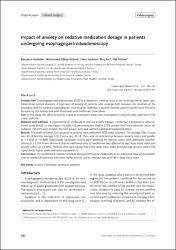Impact of Anxiety on Sedative Medication Dosage in Patients Undergoing Esophagogastroduodenoscopy
Özet
Introduction: Esophagogastroduodenoscopy (EGD) is a diagnostic method used in the investigation of upper gastrointestinal system diseases. A high level of anxiety of patients who undergo EGD increases the duration of the procedure and the sedation and analgesic requirements. Sedation is used to increase patient comfort and tolerance by reducing the anxiety and pain associated with endoscopic procedures. Aim: In this study, the effect of anxiety scores on medication doses was investigated in patients who underwent EGD under sedation. Material and methods: A psychiatrist, an endoscopist and an anesthesiologist conducted a prospective observational study blindly to investigate the effect of pre-procedural (before EGD) anxiety level on medication doses for sedation. Patients were divided into two groups, with and without additional medication doses. Results: The study included 210 consecutive patients who underwent EGD under sedation. The average STAI-S score was 40.28 and the average STAI-T score was 40.18. There was no relationship between anxiety scores and gender (p = 0.058, p = 0.869). Statistically significant results were obtained for anxiety scores with additional sedation dosing (p < 0.05). It was observed that an additional dose of medication was affected by age, body mass index and anxiety scores (p < 0.005). Patients who were young, had a low body mass index and had high anxiety scores had significantly higher additional dose requirements. Conclusions: The medications used for sedation during EGD may be inadequate or an additional dose of medication may be needed for patients who have higher anxiety scores, younger age, and lower body mass index.
Cilt
13Sayı
2Bağlantı
http://hdl.handle.net/11363/1097Koleksiyonlar
Aşağıdaki lisans dosyası bu öğe ile ilişkilidir:


















